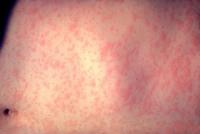-
U.S. measles cases top record, putting measles elimination status at risk

The U.S. Centers for Disease Control and Prevention (CDC) said Thursday that 971 cases of measles have been reported this year, topping the 1994 modern-record level, and it warned that the United States could lose its measles elimination status. Amid the growing measles crisis, the conspiracy-fueled anti-vaccination campaign of misinformation continues unabated on social media. DHS mulls a travel ban on measles-infected individuals.
-
-
The U.S. drinking water supply is mostly safe, but that’s not good enough

Most Americans take clean drinking water for granted as a convenience of modern life. The United States has one of the world’s safest drinking water supplies, but new challenges constantly emerge. As a scientist specializing in water quality, I believe water providers and regulators can’t afford to be complacent.
-
-
The “anti-vaxxer” movement and disinformation are fueling the spread of preventable diseases
Outbreaks of vaccine-preventable diseases, including measles, mumps and whooping cough, have again become an issue in Western and developed countries. Developing or conflict-ridden countries have far more cases of malaria and other diseases, but infection rates in the United States and Europe are on the rise. The number of cases is lower than in developing countries, but outbreaks in economically advanced countries can create sudden and sharp disruptions. Stratfor says that one key factor driving these outbreaks is a growing “anti-vaxxer” movement, which has encouraged an increasing number of people to avoid immunizations. Simply put, the more unvaccinated people there are, the more likely disease outbreaks are to occur. Influential political parties and public figures in the United States and Europe have expressed skepticism over the effectiveness and safety of vaccines and the rights of the government to regulate personal health decisions. These ideas have spread through social media and other communications channels, and ill-informed campaigns frequently cite scientific studies that have been soundly debunked. Subversive Russian social media campaigns have also contributed to the growth of the “anti-vaxxer” movement in recent years. The vaccine controversy is one of many divisive issues that the Kremlin has been exploiting to sow dissension in Western countries, particularly during election seasons. A 2018 study published in the American Journal of Public Health found that Russian troll farms had been spreading such disinformation. Numerous politicians and public health officials have pointed out Moscow’s efforts.
-
-
Crowds, social gatherings facilitate disease transmission
Large gatherings — from music festivals to religious pilgrimages to sporting events — have long been known to increase risks of infectious disease outbreaks. Now results from a new study associate even small-scale community gatherings with increased transmission of diarrheal diseases.
-
-
U.S. measles total climbs by 60 to reach 940 cases
The nation’s number of measles cases continues to climb steadily, with 60 more cases reported over the last week, raising this year’s total to 940 cases. Meanwhile, in global measles development, European officials today warned of a high risk of more widespread circulation due to gaps in vaccine coverage.
-
-
Antibiotics found in some of the world's rivers exceed “safe” levels
Concentrations of antibiotics found in some of the world’s rivers exceed “safe” levels by up to 300 times, the first ever global study has discovered. Researchers looked for 14 commonly used antibiotics in rivers in 72 countries across six continents and found antibiotics at 65 percent of the sites monitored.
-
-
Coal-fired power plants may affect your drinking water
When you get a drink of water from your fridge or sink, do you think about where that water came from? A new study takes a national look at whether coal-fired power plants are unintentionally affecting drinking water treatment plants.
-
-
Immune to drugs: Antimicrobial resistance could kill 10 million a year
The Centers for Disease Control and Prevention (CDC) contends that, “Antibiotic resistance is one of the greatest public health challenges of our time.” Annually, at least 700,000 people die from drug-resistant diseases, and that number is expected to increase to 10 million deaths per year by 2050 if nothing is done. In the U.S., antimicrobial resistance causes more than 2 million infections and 23,000 deaths per year – the equivalent of a Boeing 747 crashing each week. Nicole Fisher writes in Forbes that at present, the incentives to get something done are so misaligned, that in addition to the personal tragedies, there are other frightening possibilities. For example, experts note that “without immediate global action, the crisis of drug resistance bacteria and viruses could lead to an economic catastrophe as bad as the 2008-2009 global financial crisis, and by 2030 could force as many as 24 million people into poverty.”
-
-
Statistical model helps predict future disease outbreaks

Researchers have created a statistical method that may allow public health and infectious disease forecasters to better predict disease reemergence, especially for preventable childhood infections such as measles and pertussis.
-
-
Scent-based strategy blocks mosquito transmission of disease
Could it be that your scent is just a bit too attractive? It is known that mosquitoes are drawn to certain human chemical odors that lead the insects to sources of food. New technology would temporarily modify skin microbiome to reduce attraction of disease-causing mosquitos by altering human scents.
-
-
Current vaccination policies not enough to prevent measles resurgence
Current vaccination policies may not be sufficient to achieve and maintain measles elimination and prevent future resurgence in several advanced countries. “Our results suggest that most of the countries we have studied would strongly benefit from the introduction of compulsory vaccination at school entry in addition to current immunization programs,” says the author of a new study.
-
-
Will the next cyberattack be in the hospital?
You may not think of hackers targeting hospitals, but this is where our wired world may be most vulnerable, and the results could be deadly. Israeli startup Cynerio aims to stop hackers from targeting medical devices, a potent new danger in our connected world.
-
-
Predicting top 25 U.S. counties at risk for measles outbreaks
A team of researchers has identified 25 U.S. counties that are most likely to experience measles outbreaks in 2019. As of late May, the U.S. has seen more than 800 [cases of measles this year, the highest number in decades. Although measles was officially eliminated from the U.S. in 2000, the ongoing outbreak shows that the nation remains at risk.
-
-
Anti-vaccine advocates spread misinformation at an anti-vaccine rally amid raging measles outbreaks
Andrew Wakefield, Del Bigtree, and other prominent anti-vaccine advocates unleashed fear and toxic misinformation on Monday, 13 May, at a well-attended symposium in New York’s Rockland County, the location of one of the largest and longest-standing measles outbreaks in the country. Beth Mole writes in ArsTechnica that the event was billed as being a “highly informative night of science and discussion addressing your concerns, fears, and doubts,” but that the speakers made numerous unsubstantiated and egregiously false claims—as usual. In one instance, Brooklyn Orthodox Rabbi William Handler reportedly made the unsubstantiated claim that getting measles, mumps, and chickenpox reduces the risk of cancer, heart disease, and stroke by 60 percent. He did not provide a citation.
-
-
Tracking down the people behind a pamphlet that's fueling New York's measles outbreak
Dr. Patricia Ruppert, the health commissioner of Rockland County, New York, where there have been 225 measles cases confirmed since October, told CBS News that misinformation is fueling the rise in cases, especially within the county’s orthodox Jewish community. For at least the last four years, what’s come to be known as the “PEACH pamphlet” has been targeting orthodox Jewish communities in the Northeast. “It holds a lot of unscientific and erroneous information,” Ruppert said. The pamphlet claims vaccines are a contributing factor in causing autism even though the overwhelming consensus of the scientific community is that vaccines do not cause autism. But Ruppert had no idea who is behind the pamphlet. So we tried to find out.
-
More headlines
The long view
We Ran the C.D.C.: Kennedy Is Endangering Every American’s Health
Nine former leaders of the Centers for Disease Control and Prevention (CDC), who served as directors or acting directors under Republican and Democratic administrations, serving under presidents from Jimmy Carter to Donald Trrump, argue that HHS Secretary Roert F. Kennedy Jr. poses a clear and present danger to the health of Americans. He has placed anti-vaxxers and conspiracy theorists at top HHS positions, and he appears to be guided by a hostility to science and a belief in bizarre, unscientific approaches to public health.
